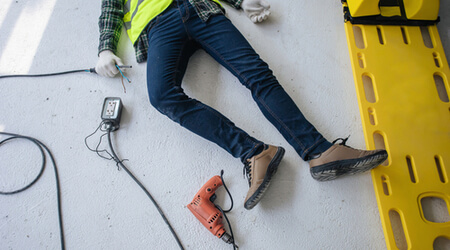
Construction workers are constantly working with and around electrical equipment, circuits, and power lines. Electricity poses a serious health risk to workers if safety measures are neglected.
Over a recent seven-year period, around 5,500 construction workers suffered electrical accidents – more than in any other industry, including utilities.
In fact, a construction laborer is more likely to suffer a fatal electrical injury than an electrical power line installer or repairer.
To protect construction workers from electrocution, the Occupational Safety & Health Administration (OSHA) has implemented numerous standards pertaining to electrical work. Lack of compliance with electrical standards, however, is among the most frequently cited OSHA violations.
OSHA non-compliance, when it leads to worker injury, may be used as evidence of negligence in a third-party lawsuit. The compensation available through such a lawsuit is independent of workers’ compensation benefits.
The right lawyer can make obtaining maximum compensation for your electrocution accident easier. If you or a relative suffered electrocution on the job site in South Carolina, you’re entitled to a free case review from Joye Law Firm.
Our South Carolina injury lawyers have fought for injured workers for more than four decades, and we want to help you, too. Call Joye Law Firm now or send us a message to get started.
Types of Electrical Accidents at Construction Sites
The Electrical Safety Foundation International (ESFI) has workplace electrical injury data stretching back to 1992. ESFI codes electrical injury events according to the nature of the injury, which may include contact with any of the following:
- Electric current of machine, tool, appliance or light fixture
- Wiring, transformers or other electrical components
- Overhead power lines
- Underground power lines
Among construction workers, the top cause of non-fatal electrical injuries is contact with wiring, transformers or other electrical components. Fatal accidents involving electricity and construction workers are most often caused by contact with overhead power lines.
OSHA and Accidents With Electricity
OSHA cites the following hazards as the most frequent causes of harm:
- Contact with power lines
- Lack of ground-fault protection
- Path to ground missing or discontinuous
- Equipment not used in manner prescribed
- Improper use of extension and flexible cords
These hazards reflect OSHA’s safety and health regulations for the construction industry. Among the numerous electrical regulations promulgated by OSHA are those relating to:
- Wiring design and protection
- The use of insulated gloves and other safety equipment
- Lockout and tagging of circuits
- The grounding and de-energizing of circuits
- Electrical tool maintenance
Despite the high potential danger of electricity, OSHA electrical standards are often violated. OSHA reports that standards for electrical wiring methods and components and equipment are the fifth-most violated, while electrical systems design standards are the ninth-most violated.
OSHA Violations, Negligence and Third-Party Lawsuits
South Carolina workers’ compensation provides benefits, including medical care and partial lost wage reimbursement, to workers injured on-the-job. You do not have to prove employer wrongdoing in order to receive workers’ comp benefits, but there is a tradeoff: you lose the right to sue your employer.
You may, however, sue a negligent third party with whom you have no employment relationship. This third party could be the property owner, a general contractor or a subcontractor, for example. Unlike a workers’ comp claim, you must prove wrongdoing on the part of the parties you are suing.
An OSHA violation may serve as evidence of negligence. Often, it is the general contractor on a construction site who is responsible for ensuring OSHA compliance. The employer of another subset of workers – such as the head of an electrician team – may also bear responsibility, even if the examination duty has been delegated to one of the workers.
Talk With A South Carolina Workers’ Comp Attorney Free of Charge
The construction accident attorneys of Joye Law Firm have nearly 250 years of combined legal experience and are ready to help injured construction workers and their families obtain appropriate payments for electrical injuries suffered in construction accidents in South Carolina.
Call Joye Law Firm now or submit our online contact form for a free case review and information about your legal rights.
Sources:
- Occupational Safety & Health Administration:
- Safety and Health Regulations for Construction—Subpart K—Electrical
- Top 10 Most Frequently Cited Standards
- Electrical Incidents
- Electrical Safety Foundation International: Workplace Electrical Injury and Fatality Statistics, 2003-2010































